Issue #45 - The beauty behind 'The Florist Bar'
This is a Brazilian newsletter, originally written in Portuguese and the following edition has been specially released in English as well.
In today's edition: A cool new story in “Queridos Estranhos” (Dear Strangers) and another comic from “As Aventuras de Astra” (The Adventures of Astra).
Did you miss the last edition? Just click here👇🏼
Also remember that you can access the content directly by e-mail (via subscription free of charge), on the website, or in the Substack app.
In May 2023 I took an incredible trip through Italy with four of my best friends.
Our meeting point was Rome, from where we headed to Naples, the land of the famous Neapolitan pizza. It wasn't just the cuisine that attracted us. Naples is one of the oldest cities in the West and serves as a strategic point for visiting Pompeii and Capri. Finally, we ended our almost cinematic journey in Sardinia. We have many stories to tell, but today I want to share one in particular.
We had rented an apartment in the heart of Naples, and it was through Google recommendations, looking for cafés nearby, that we discovered a small, somewhat hidden, very charming establishment located near the city's Botanical Gardens. I can list several factors that fascinated me: the welcoming atmosphere, the simplicity, the taste, the attentive and intimate service, and the fact that everything served came from ingredients grown by the owner herself, right down to the honey. No wonder we went back for another coffee before we left. My friends and I will always remember the place fondly. More than a year passed and I kept thinking about that café. It was then that I decided to seek out and get in touch with Stefania Salvetti, the landscape architect who created and owns the space, and discovered that 'The Florist Bar' is much more than just a charming place.
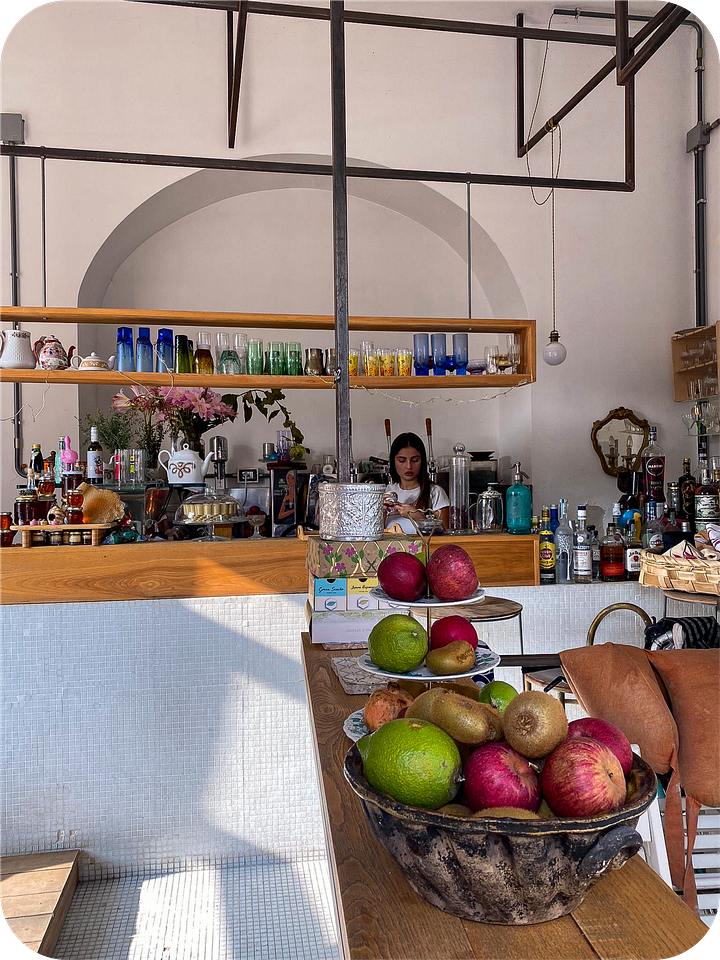
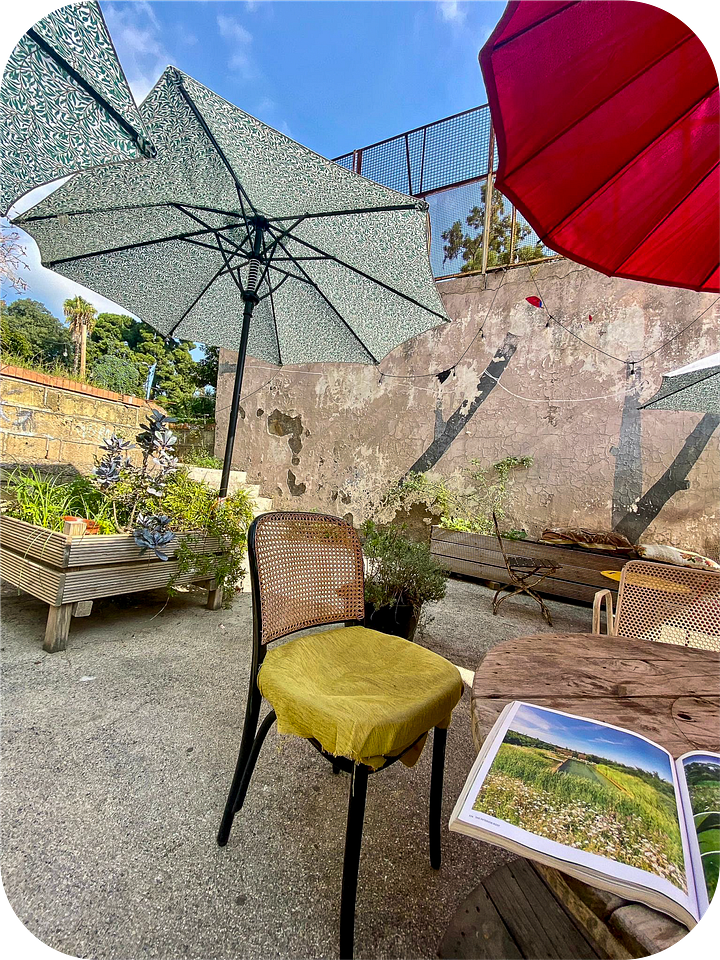
Stefania was born in southern Italy, studied architecture and worked abroad in London, Sweden and other Nordic countries. Life's journey led her to Médecins Sans Frontières, where she worked as a builder, as well as providing logistics and sanitation services in occupied areas, wherever help was needed in the world. It was on the project in Nairobi that she met a Neapolitan colleague, whom she married a few days later. The couple continued their humanitarian work around the world, and Stefania dedicated herself to Médecins Sans Frontières for fifteen years.
When she returned to Naples, pregnant with her first child, she bought a house in an area called “Il Paradisiello”, which means “Paradise”, where she began to cultivate the land and raise chickens. Stefania longed to return to her hometown, with the aim of cultivating her own land and contributing to the local community.
This “hidden” place in the city center is behind the Botanical Gardens, next to the Santa Maria degli Angeli Alle Croci Church and other historic sites. In the 16th century, the whole area was made up of fields, but with the construction of the church, the process of urbanization began. From the 18th century onwards, Paradisiello became one of the most sought-after places for the nobility, who aimed to build their villas for “vacation” and leisure, after all it was a true haven of peace in the heart of Naples. Later, the area, which was still fertile and had a beautiful view of Vesuvius, fell into oblivion.
Passionate about plants and gardening since she was a child, she began to study the subject on her own. The architect works with biodynamic agriculture, which is an agricultural model that doesn't use chemicals, genetically modified organisms, herbicides or the like. It is similar to organic farming, but it is a food cultivation system based on the principles of anthroposophy, the philosophy that seeks to understand the relationship between human beings and the universe. She is also dedicated to permaculture, which aims to create sustainable and productive human settlements in harmony with nature.
The combination of her passion for plants and her profession as an architect led her to dedicate herself to projects to revitalize abandoned green areas and create urban gardens, with the intention of helping to maintain the city and raise awareness among Neapolitans and their younger generations, encouraging natural farming and eating.
It was then that, at the request of the town hall, Stefania took over the management of some nearby gardens in a very run-down area. With the desire to make the garden a place for everyone, she decided to link the urban revitalization project to an enterprise that could move and inspire the community. Thus, in 2019, “The Florist Bar” was born, where all the ingredients come from the lands of Naples, more specifically grown in 'Paradisiello', and picked daily in the mornings, which means that the menu changes constantly. Curiously, 150 steps and a few more meters separate “Il Paradisiello” from the bar, and that's the route she takes every day.
She wanted a name that was easy to remember, had a universal concept and was associated with nature. The idea was to explore the relationship between Neapolitan culture and the idea of cultivating the land, showing the wonderful products it can provide. With the bar, she aims to bring a different perspective and show what can be done, encouraging other entrepreneurs to do the same, as this type of business is needed in the city.
Talking about the concept and menu of the place, Stefania said that she used to cook with her parents on Sundays, and considered herself more of a salt person than a sweet person, as she made more pasta and pizza. When she opened the bar, she found herself making cakes, with recipes she created according to the availability of ingredients in the garden, combining a healthy food concept with Mediterranean ingredients. Coffees, juices, slices of artisan bread with homemade ricotta and honey - my favorite - wonderful dried and fresh fruit, and homemade cakes, such as lavender with almonds and lemon with cream - extremely delicious - which departs from the traditional recipe, as the cream is made only with lemon. In the evening, it offers sandwiches, burrata, hummus, crudités, and cocktails with edible flowers, a specialty of the house, which change with each season. To cater to the public and make the most of her ingredients, she also became a mixologist.
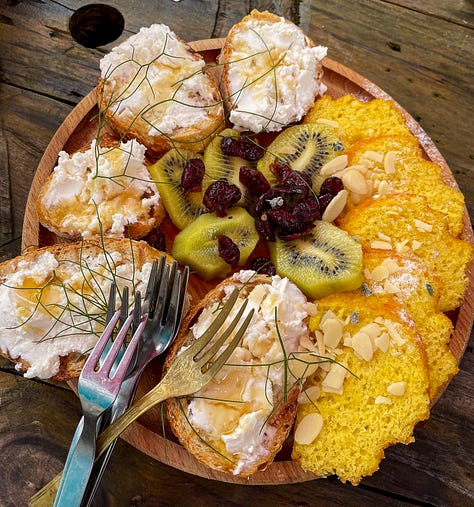
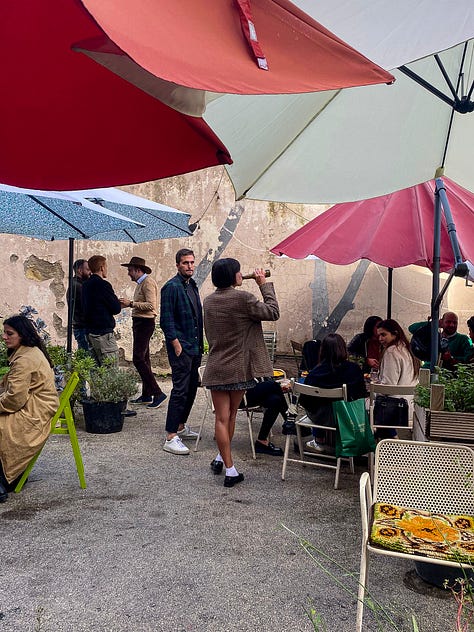
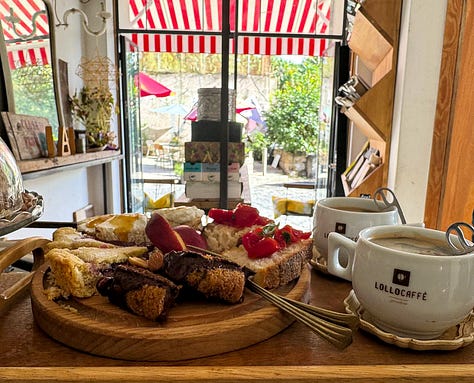
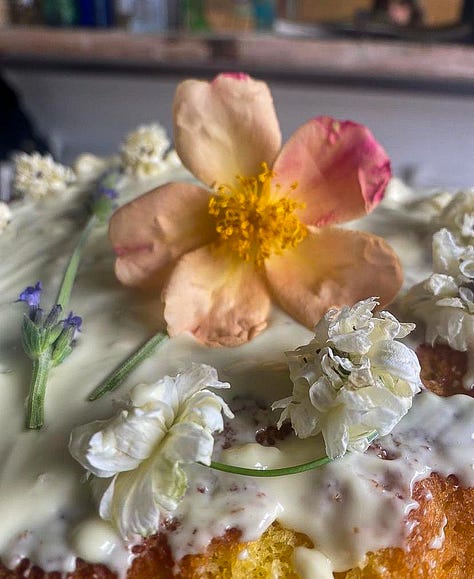
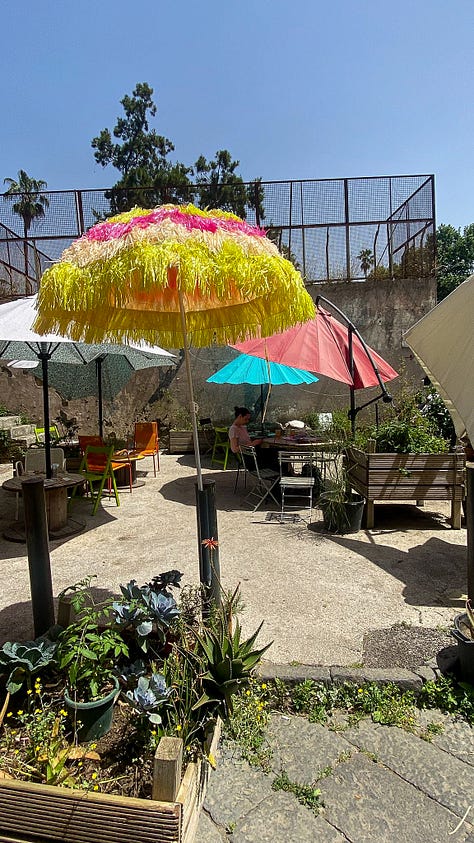
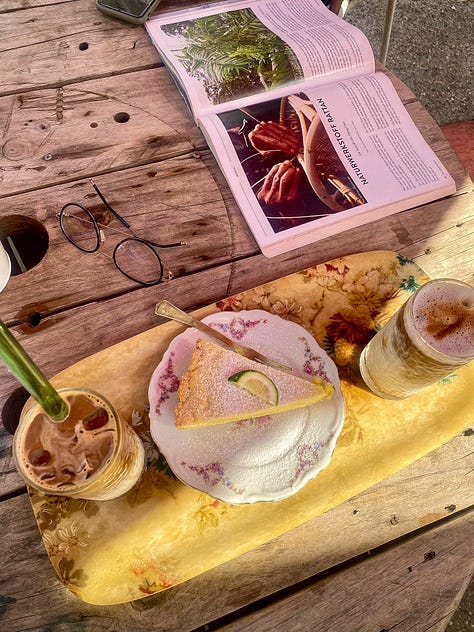
The bar is small, rustic, familiar and inviting, with tables and chairs outside in the garden. The place is sunny, even on cloudy days. Stefania is affectionate and it's impossible not to feel welcome. The simple food is well presented and is especially notable for the ingredients that set it apart. And the feeling I got was that it is possible to establish a deeper connection with the city through places like this. There is a beauty not only in what is on offer, but in the proposal of the place.
I was completely taken aback by the story of Stefania and “The Florist Bar”. I can say that I agree with the saying that we admire a dish not just for its taste, but for the story it tells us.








